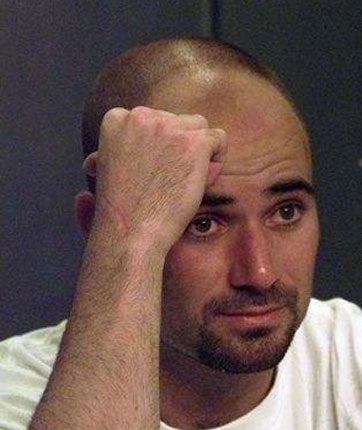Agassi avoids punishment after lying about drug use
Anti-doping agency asks ATP to explain why crystal meth abuse was ignored

Andre Agassi will face no retrospective punishment for taking crystal meth – a banned, illegal and highly addictive drug – in 1997, or for telling lies as a part of a subsequent cover-up to avoid a ban from tennis.
However, the president of the World Anti-Doping Agency (Wada), John Fahey, said yesterday that he would like the ATP, the world governing body of men's tennis, to "shed light" on how Agassi's drug taking was effectively ignored. The case falls outside Wada's eight-year statute of limitations, while the ATP will not seek to impose any sort of ban over any current or future involvement in the sport.
The case, which Agassi discloses in his autobiography, Open, raises fresh questions about the extent to which the ATP hid or ignored a drugs problem within the sport in the days before Wada was founded, in 1999. Many sports, including tennis, administered their own anti-doping programmes before the Wada code obliged all governing bodies to make positive tests public.
The ATP, which signed up to the code in 2004, is now exemplary in the fight against drugs in sport, making public all its findings. But it has been accused historically of trying to bury bad news (announcing Petr Korda's failed drug test from summer 1998 over Christmas that year) and of a lack of transparency and inconsistencies in drug cases, as when dozens of players, including Britain's Greg Rusedski, produced samples suggesting steroid use but faced no penalties. Tainted nutritional supplements, supplied by the ATP, were accepted as the reason.
Agassi's revelations will only increase suspicions that the ATP – effectively run by the players – was soft on drugs in the past.
Agassi, 39, who won Wimbledon in 1992, lifted five of his eight Slam trophies in the "comeback" phase of his career, post-1997. He says he first took crystal meth that year – the worst of his career in terms of results – with a former assistant, named as "Slim".
Agassi writes: "Slim dumps a small pile of powder on the coffee table. He cuts it, snorts it. I snort some. Then comes a tidal wave of euphoria that sweeps away every negative thought in my head. I've never felt so alive, so hopeful."
Agassi failed a drugs test late in 1997. He was notified by a doctor from the ATP – which kept the failed test secret – and says he wrote a letter to argue he took the drug by accident.
He writes about that period: "My name, my career, everything is now on the line. Whatever I've achieved, whatever I've worked for, might soon mean nothing." He adds that his letter to the ATP was "filled with lies interwoven with bits of truth", and says that he told the ATP that Slim was a known drug user.
Agassi writes: "He [Slim] often spiked his sodas with meth – which is true. Then I come to the central lie of the letter. I say that recently I drank accidentally from one of Slim's spiked sodas, unwittingly ingesting his drugs. I ask for understanding and leniency and hastily sign it: Sincerely. I feel ashamed, of course."
Agassi says the ATP reviewed his case, which would have led to a minimum three-month ban for using a recreational drug, believed his explanation, and let him off.
The Independent asked the ATP questions yesterday regarding failed drugs tests by Agassi and other players, and past cover-ups. The governing body issued a confusing statement that threw little light on the matter.
It said: "It has always been ATP policy not to comment on anti-doping test results unless and until an anti-doping violation has occurred. Under the tennis anti-doping program it is, and has always been, an independent panel that makes a decision on whether a doping violation has been found. The ATP has always followed this rule and no executive at the ATP has therefore had the authority or ability to decide the outcome of an anti-doping matter."
*Serena Williams will end the year as world No 1 for the first time since 2002 after Dinara Safina withdrew from the WTA Championships in Doha with a back injury yesterday. Williams won her first match on Tuesday against Svetlana Kuznetsova, guaranteeing enough points to overtake Safina, who retired after two games against Jelena Jankovic clutching her lower back.
Subscribe to Independent Premium to bookmark this article
Want to bookmark your favourite articles and stories to read or reference later? Start your Independent Premium subscription today.

Join our commenting forum
Join thought-provoking conversations, follow other Independent readers and see their replies